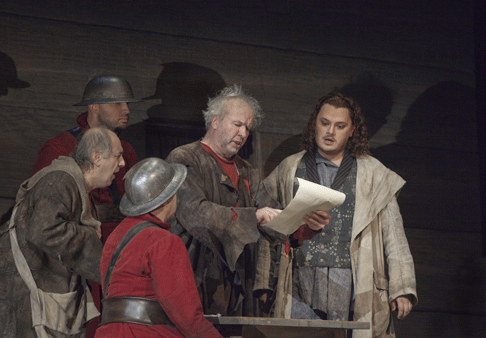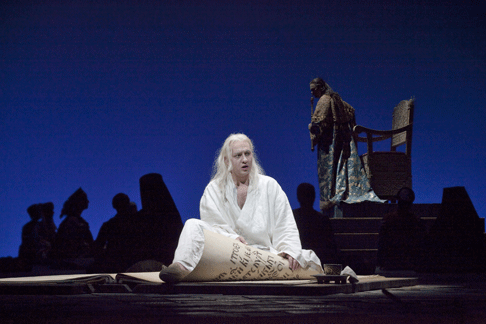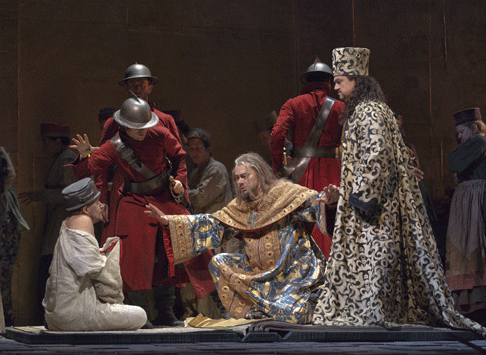There were standing ovations for both Pape and
Chorus. Both deserved it. So did most of the rest of the singers, the
orchestra, and Maestro Gergiev. It was a night of glorious music-making, a
glorious score brilliantly done by, and in the original orchestration to boot.
(But the original orchestration has been in use at the Met since 1974.)
And yet—I cannot call it an entirely successful presentation of this
opera.
Mussorgsky’s sprawling tragedy has two protagonists: The haunted tsar
is one— he only appears in three or four scenes (depending which version
is used) but he stamps his personality on the grand opera canvas. The other?
the Russian people, who hail Boris as a symbol of hope, then revile him as the
“Tsar Herod” whose crimes have brought the anger of heaven down on
Russia. Boris ultimately goes mad and dies, but much worse is in store for
Russia in the eight years that will follow the final curtain: plagues, famines,
massacres, wars, usurpers: three of the opera’s many lesser characters
will ascend the throne and come to bad ends, two foreign invasions and
occupations of Moscow—and only then, when they’ve given up all
hope, the Romanovs will take over. (You can find out all about this in
Dvorak’s Dmitri and Glinka’s A Life for the Tsar.
I don’t think anyone’s ever composed an opera about slimy Prince
Shuisky, who became Vassili IV.)
Boris has been called the Russian Macbeth. He’s an ambitious man, full
of excellent intentions, who commits a serious crime in order to take power in
his troubled country—only to be haunted to madness by the horror of his
deed. No one knows if the real Boris slew the heir to his
brother-in-law’s throne, and in Pushkin’s play, the source of the
opera’s libretto, Boris himself isn’t sure. But of his ambition, of
his scheming route to the coronation in the opera’s prologue, we are left
in no doubt. This makes his uneasiness at the appearance of a pretender to the
dead boy’s identity, his gradual descent into madness torn between
insecurity and hope for heavenly forgiveness (if the boy was not slain), the
tragic foreground of a plot that ranges across seven years of disaster and a
great geographic space as well. Boris’s death in the penultimate scene
(which Chaliapin and others placed at the opera’s conclusion for reasons
of drama and egomania) is his personal tragedy; Mussorgsky’s final scene
shows the rebellious peasants welcoming the pretender as they avenge their
brutal circumstances on anyone available.
That finale has never been staged so graphically: captured boyars have their
throats slit, Catholic priests are lynched, women taunt and spit in the faces
of spies and bullies, and the Polish forces move slowly, inexorably on Moscow.
Singing magnificently, the Met Chorus works its dramatic chops in a tableau of
barbarism.
 Vladimir Ognovenko as Varlaam and Aleksandrs Antonenko as Grigory
Vladimir Ognovenko as Varlaam and Aleksandrs Antonenko as Grigory
The new production was straightforward and inoffensive—but makes one
sigh for the glitter of Ming Cho Lee’s onion domes and marble fountains
in the last Met Boris. In certain important points Stephen
Wadsworth’s direction seemed not so much spare as actively wrongheaded.
Symbolic of the whole puzzling occasion was the row of enormous church bells
that descends from the roof of the stage at the end of the Coronation Scene,
just as the sound of those pealing bells with their rejoicing that we already
suspect is ill omened, explodes from the orchestra—but the visible bells
do not move. Bells that do not move make no sound. Why show them? Why
contradict the music so blatantly? Why give us scenery and ignore it?
Couldn’t they have been made to move, even if they did not sound? Or, to
save money, couldn’t they have not appeared at all, only sounded?
Wadsworth had a mere five weeks to put an interpretation together after
Peter Stein withdrew, but though he boasts of forty years acquaintance with the
opera, he seems to have misunderstood it on a basic level. This Boris is not
the titanic figure we have come to expect, the vehicle who made Chaliapin and
George London and Martti Talvela into stage legends. This Boris is nervous,
wishy-washy, thrust into power he has not sought—which gives us a hollow
place at the center of the drama. During the pious speech at the coronation,
when most Borises utter hollow protestations to God while grasping the crown,
Pape seems actively uncomfortable to be handling it at all. Then why does he
have it? Why did he have the police badger the peasants to demand he take it?
Plenty of other boyars would like it. Too, he enters with his young children,
who appear and sing (in play and opera) only in the contrasting domestic scene
in the Kremlin. As a result of their appearance here (which I attribute in part
to Wadsworth running out of ideas and a stage space that can only be called
claustrophobic—and it’s supposed to be Red Square, for God’s
sake!), since we never see the children grow any older, the story’s
duration is necessarily telescoped from seven years to a few weeks, which
hardly seems time enough for the Russians to be starved into rebellion. The
story Pape and Wadsworth give us is not a tragedy, or a legend on monumental
scale—it is a minor domestic matter.
This makes a mockery, too, of the enormous Book of History (I’m
guessing; some of its pages also bear music notation) that occupies an enormous
place on the floor of the stage, so that Pimen can write in it, Gregory/Dmitri
look over his shoulder, Marina can sneer at it, the Holy Fool try to warm
himself in it as if among parchment blankets, and all the Russian masses
trample over it uncaring. Feodor Godunov’s map, too, is scattered about
the floor. (This is one of Pushkin’s nods to historical trivia: the first
map ever made of Russia was drawn by the 15-year-old tsarevich. In Ming Cho
Lee’s Kremlin, it was reproduced on the wall.) The focus here is on human
beings just like us—but they aren’t much like Pushkin’s human
beings, and Mussorgsky was composing for those.
 Mikhail Petrenko as Pimen and RenÈ Pape (background) as Boris
Mikhail Petrenko as Pimen and RenÈ Pape (background) as Boris
Despite this wrongheaded straitjacket of an interpretation, Pape holds our
ears and eyes throughout the evening. He is a superb actor and singer whose
Russian was impressively idiomatic, but who moves in this production only from
depressed to severely depressed, not from grandeur and triumph to dust, ashes
and madness. I’d love to see Pape in a more plausible interpretation of
the character.
Chaliapin’s vision of ghostly Dmitri used to terrify everyone who saw
it, but I remember a shudder ran through the audience when the Holy Fool called
Martti Talvela “Tsar Herod” and he responded with a galvanic shock.
In this production, though Andrey Popov’s singing and acting are all one
could desire in a Fool, the arrangement of the stage, with all action shoved to
the front by featureless walls, does not permit the proper effect to be made.
This is Boris Godunov intimate—and ignores the fact that this is
a grand opera, demanding all the flourishes and scenic spectacles of
the nineteenth century’s mightiest form.
There is no ballet to speak of in the Polish scenes in this production,
either. The Polish scenes are set musically as well as dramatically in another
world from Muscovy: Western, Roman Catholic, enlightened, unRussian, all the
things Mussorgsky (and the Russian in the street) were raised to loathe. The
Polish-Lithuanian republic was the largest state in Europe in 1605, and they
made use of Dmitri to bring Muscovy into the Polish and Roman orbit. Neither
Dmitri nor the Poles have ever been forgiven for their perfidy— to this
day, Grishka Otrepev (Dmitri) is solemnly cursed in the Anathema liturgy of the
Russian Orthodox Church.
In this production we know the Poles are in a different world from the
Russians because the Russians wear costumes in color, roughly of the proper
period (c.1600), but the Poles are dressed c. 1800, and all of them wear white
except Marina and Father Rangoni, who wear black, the latter with sinister
purple gloves: the Jesuit as vampire. To stress that he is evil, as if
Mussorgsky had not made that quite clear enough with his snaky music, sturdy
Evgeny Nikitin also has his slimy hands all over Marina’s body. (For the
first thirty years the opera was performed in New York—which has a huge
Catholic population, after all—the role of Rangoni was simply omitted so
as not to give offense.) The operagoer in the street, the Met seems to assume,
has forgotten the Jesuit’s legendary gift for intrigue, so they have
replaced it with the new popular myth of the Catholic priest as constant
lecher. (I’m not criticizing; I think it’s interesting to track the
evolution of legend.)
 Andrey Popov as the Holy Fool, RenÈ Pape as Boris and Oleg Balashov as Shuisky
Andrey Popov as the Holy Fool, RenÈ Pape as Boris and Oleg Balashov as Shuisky
Among the enormous and memorable cast, I especially enjoyed Mikhail
Petrenko’s Pimen during his appearance before the tsar, Vladimir
Ognovenko’s mellifluously blustering Varlaam, Jennifer Zetlan and
Jonathan Makepeace as the tsar’s children (though I’d have liked
them better had they only appeared in scenes where Mussorgsky calls for them),
Valerian Ruminski’s effective Nikitich and Ekaterina Semenchuk’s
Marina. Semenchuk, in particular, the superb Olga of the Met’s last
Onegin, has a very beautiful and very Slavic lower register and makes a
striking figure (in black against the Polish white). Aleksandrs Antonenko has a
“Russian bleat” to his tenor that is not attractive as sheer sound
but which he uses effectively to indicate the torture of conflicting passions
(revenge, ambition, lust): an exciting if not a moving performance. Oleg
Balashov, who plays Prince Shuisky, a great character role, has a pretty voice
but sings without projecting the plot or the personality; I wish he and Andrey
Popov’s sublime Holy Fool could have switched roles, but what’s a
Boris without an excellent Fool?
All the production’s visible miscues can be ignored when a cast like
this, a chorus like this, an orchestra like this are led by a conductor who can
calculate Mussorgsky’s defiantly barbaric nuances as stunningly as this.
It’s a great show, and while Gergiev is conducting it, and a singing
actor like Pape, however oddly directed, holding the Kremlin against all
comers, Boris is not to be missed.
John Yohalem
image=http://www.operatoday.com/BORIS_Pape_as_title_role_02.gif
image_description=RenÈ Pape as Boris Godunov [Photo by Ken Howard courtesy of The Metropolitan Opera]
product=yes
product_title=Modest Petrovich Musorgsky: Boris Godunov
product_by=Boris: RenÈ Pape; Marina: Ekaterina Semenchuk; Xenia: Jennifer Zetlan; Innkeeper: Olga Savova; Feodor: Jonathan Makepeace; Grigory/Dmitri: Aleksandrs Antonenko; Holy Fool: Andrey Popov; Nikitich: Valerian Ruminski; Prince Shuisky: Oleg Balashov; Pimen: Mikhail Petrenko; Varlaam: Vladimir Ognovenko; Rangoni: Evgeny Nikitin. Production by Stephen Wadsworth. Chorus and orchestra of the Metropolitan Opera, conducted by Valery Gergiev. Performance of October 18.
product_id=Above: RenÈ Pape as Boris Godunov
All photos by Ken Howard courtesy of The Metropolitan Opera